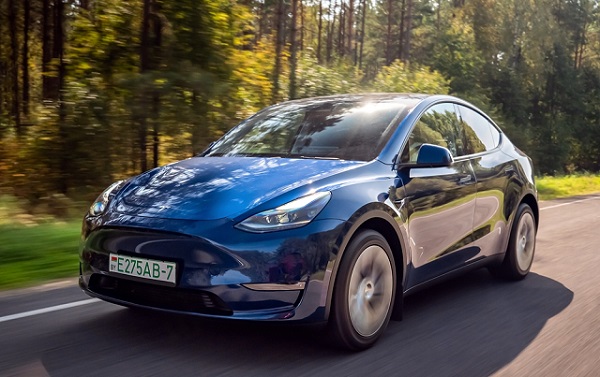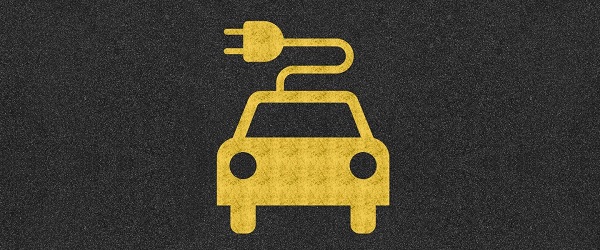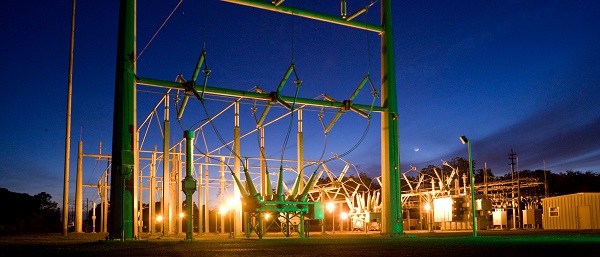Automotive
Electric vehicle weight poses threat to current road infrastructure, safety experts warn

Tesla Model Y
From LifeSiteNews
By Bob Unruh
A report in the Washington Times explains that electric vehicles (EVs) can weigh up to 50 percent more than internal combustion motor vehicles. That extra weight could more easily damage roads, bridges, and parking garages.
If all of the existing headaches for those pushing expensive electric vehicles on resisting American consumers could vanish, there’s still a big one that may have no ready solution.
Already, it appears the U.S. could end up dependent on unfriendly nations for materials for all those batteries. Then there’s the fact that the nation’s grid simply can’t support all that recharging – California already has been sending out advisories for owners not to charge. And then there’s the limited range, extended recharging times, both worsened by bad weather.
But now a report in the Washington Times explains that those batteries are heavy, and EVs can weigh up to 50 percent more than internal combustion motor vehicles.
And that weight damages roads, bridges and parking garages, with those vehicles easily plowing through safety guardrails while posing a higher danger to other drivers, pedestrians and bicyclists traveling the same routes.
“The problems associated with EVs are poised to grow as more consumers purchase the cars under the Biden administration’s plan to eliminate gas-powered vehicles and the tailpipe emissions that come with them,” the report explained.
It explained engineers writing recently for Structure Magazine suggested construction companies, and building codes, need to make accommodation for the higher weight.
Parking garages, they said, should be redesigned to hold more weight.
That’s because some hold hundreds of vehicles, and just one EV. A Ford truck, weighs in at 8,240 pounds, nearly a ton (about 1,000 kg) more than the gas-powered version of the same pickup.
“Significantly increasing passenger vehicle weights combined with recently reduced structural design requirements will result in reduced factors of safety and increased maintenance and repair costs for parking structures,” the engineers wrote. “There are many cases of parking structure failures, and the growing demand for EVs will only increase the probability of failure.”
Then there are those guardrails, installed to minimize damage when traffic goes awry.
They are installed between lanes for traffic moving opposite directions, between lanes and edge drop-offs and more.
That concern comes out of a procedure at a test facility in Nebraska, where examiners took a 3.6-ton Rivian R1 and sent it into a metal guardrail at 62 mph, first head-on, then at an angle.
Both times it “ripped through” the guardrail and continued into what would have been lanes for oncoming traffic, the report revealed.
The conclusion was simple: making vehicles much heavier means “a lot more force” is required to redirect the vehicle.
University of Nebraska professor Cody Stolle, told the Times, “We found these guardrail systems don’t have great compatibility with these [electric] vehicles yet.”
The heavier vehicles also could cause more damage to other vehicles in collisions.
The report said an insurance institute expert confirmed the weight provides more protection to those inside the EV, but at the expense of anyone in another vehicle involved in an accident.
Joe Biden has insisted over and over that consumers should be buying the much more expensive and often less reliable electric cars the government programs subsidize.
The weight differences are significant. The report said the Tesla Model Y is more than 4,400 pounds while the similar size gas-powered Honda Accord is 3,300. Kia makes multiple SUVs, with the gas model weighting 3,900 pounds and the EV unit nearly 6,500.
Residential roads already are not engineered to handle the heavy weight on highways, and the lifespan of bridges could be reduced with much heavier traffic, the report said.
Sen. Marco Rubio, R-Fla., recently said, “EVs are typically much heavier compared to similarly sized, gas-powered vehicles, which will put additional strain on America’s transportation infrastructure. The American Society of Civil Engineers warns that an increase in EVs could substantially reduce the lifespan of roads and bridges, necessitating further investment in infrastructure.”
Reprinted with permission from the WND News Center.
Automotive
Governments continue to support irrational ‘electric vehicle’ policies

From the Fraser Institute
Another day, another electric vehicle (EV) fantasy failure. The Quebec government is “pulling the plug” on its relationship with the Northvolt EV battery company (which is now bankrupt), and will try to recoup some of its $270 million loss on the project. Quebec’s “investment” was in support of a planned $7 billion “megaproject” battery manufacturing facility on Montreal’s South Shore. (As an aside, what normal people would call gambling with taxpayer money, governments call “investments.” But that’s another story.)
Anyway, for those who have not followed this latest EV-burn out, back in September 2023, the Legault government announced plans to “invest” $510 million in the project, which was to be located in Saint-Basile-le-Grand and McMasterville. The government subsequently granted Northvolt a $240 million loan guarantee to buy the land for the plant, then injected another $270 million directly into Northvolt. According to the Financial Post, “Quebec has lost $270 million on its equity investment… but still had a senior secured loan tied to the land acquired to build the plant, which totals nearly $260 million with interest and fees.” In other words, Quebec taxpayers lost big.
But Northvolt is just the latest in a litany of failure by Canadian governments and their dreams of an EV future free of dreaded fossil fuels. I know, politicians say that it’s a battle against climate change, but that’s silly. Canada is such a small emitter of greenhouse gases that nothing it could do, including shutting down the entire national economy, would significantly alter the trajectory of the climate. Anything Canada might achieve would be cancelled out by economic growth in China in a matter of weeks.
So back to the litany of failed or failing EV-dream projects. To date (from about 2020) it goes like this: Ford (2024), Umicore battery (2024), Honda (2025),General Motors CAMI (2025), Lion Electric (2025), Northvolt (2025). And this does not count projects still limping along after major setbacks such as Stellantis and Volkswagen.
One has to wonder how many tombstones of dead EV fantasy projects will be needed before Canada’s climate-obsessed governments get a clue: people are not playing. Car buyers are not snapping up these vehicles as government predicted; the technologies and manufacturing ability are not showing up as government predicted; declining cost curves are not showing up as government predicted; taxpayer-subsidized projects keep dying; the U.S. market for Canada’s EV tech that government predicted has been Trumped out of existence (e.g. the Trump administration has scrapped EV mandates and federal subsidies for EV purchases); and government is taking the money for all these failed predictions from Canadian workers who can’t afford EVs. It really is a policy travesty.
And yet, like a bad dream, Canada’s governments (including the Carney government) are still backing an irrational policy to force EVs into the marketplace. For example, Ottawa stills mandates that all new light-duty vehicle sales be EVs by 2035. This despite Canadian automakers earnest pleas for the government to scrap the mandate.
Canada’s EV policy is quickly coming to resemble something out of dysfunctional-heroic fiction. We are the Don Quixotes, tilting futilely at EV windmills, and Captain Ahabs, trying to slay the dreaded white whale of fossil-fuelled transportation with our EV harpoons. Really, isn’t it time governments took a look at reality and cut their losses? Canada’s taxpayers would surely appreciate the break.
Automotive
Big Auto Wants Your Data. Trump and Congress Aren’t Having It.


From the Daily Caller News Foundation
Congress is not going to allow Big Auto to sideline consumer privacy and safety while getting subsidized massively by the federal government.
That is because, in late September, by an overwhelming vote of 50 to 1, Chairman Brett Guthrie’s (R-KY) House Energy & Commerce Committee joined the Senate Commerce, Science, and Transportation Committee in passing the AM Radio for Every Vehicle Act.
This legislation is in response to some automakers removing AM radios from new model vehicles despite pleas from America’s public safety community not to do so.
Dear Readers:
As a nonprofit, we are dependent on the generosity of our readers.
Please consider making a small donation of any amount here.
Thank you!
“They’d rather force consumers to use their infotainment devices — which collect and sell their third-party data — than protect American lives,” Corey Lewandowski, President Trump’s 2016 campaign manager and senior adviser to his 2020 and 2024 campaigns, stated.
The entirety of America’s public safety community spanning the federal, state, and local levels, insists AM radio remaining in cars is critical for protecting the nation’s emergency alerting systems. These systems rely heavily upon AM radio, the only communication method that has stayed reliably accessible during many disasters such as the Sept.11 terrorist attack and major disasters like Hurricanes Katrina, Sandy, and most recently, Helene.
Brendan Carr, the current chairman of President Trump’s FCC, nominated by President Trump, has also endorsed the AM Radio for Every Vehicle Act. In a statement, Carr said that “millions of Americans depend on the value of AM radio and the local news that AM broadcasters offer in communities across the country.” He also recounted hearing firsthand stories of Hurricane Helene victims who “could only access lifesaving information in the days following the storm by tuning into their AM radios.”
AM radio also serves another purpose that the elites in Silicon Valley and Detroit often forget: it keeps rural and working-class America connected. Millions of people outside the big cities rely on AM for local news, farm reports, weather alerts, and even community events. For many small towns, AM stations are a lifeline—far more reliable than expensive streaming services or spotty cell coverage. Pulling it out of cars is yet another way of telling Middle America: “you don’t matter.”
Of course, no good idea in Washington is safe from special interests.
Despite the broad support within Congress, the administration, and throughout the public safety and first responder communities, the bill has faced a full-court press by the musicFIRST Coalition — a group backed by the Recording Industry of America — to tank the legislation unless it is tied to unrelated music royalty reform legislation. That’s cronyism politics at its worst—holding public safety hostage to squeeze out another payday.
However, now that the AM Radio for Every Vehicle Act has passed both committees by overwhelming margins, the only stop left for the legislation is the House and Senate Floor — meaning Speaker Mike Johnson (R-LA) and House Majority Leader John Thune (R-SD) must call it up for a roll call vote.
At the heart of this fight is more than just whether a radio dial stays in your dashboard. It’s about whether Americans can trust that their safety won’t be sacrificed for corporate profit.
It’s also about data privacy. Automakers and Big Tech are eager to funnel drivers into infotainment systems that monitor every move, harvest personal information, and sell it to the highest bidder. AM radio doesn’t spy on you. It doesn’t crash when the grid goes down. It doesn’t put profit ahead of people. It just works.
For the sake of both public safety and personal freedom, Congress should make sure it stays that way.
Ken Blackwell (@KenBlackwell) is an adviser to the Family Research Council and a chair at the America First Policy Institute. He is a former Mayor of Cincinnati, Ohio, Ohio Treasurer and Secretary of State, and U.S. Ambassador to the United Nations Human Rights Commission. He is also a former member of the Trump transition team.
-

 Censorship Industrial Complex23 hours ago
Censorship Industrial Complex23 hours agoCanada’s privacy commissioner says he was not consulted on bill to ban dissidents from internet
-

 Alberta22 hours ago
Alberta22 hours agoEnbridge CEO says ‘there’s a good reason’ for Alberta to champion new oil pipeline
-

 Business22 hours ago
Business22 hours agoFormer Trump Advisor Says US Must Stop UN ‘Net Zero’ Climate Tax On American Ships
-

 Energy1 day ago
Energy1 day agoIndigenous Communities Support Pipelines, Why No One Talks About That
-

 Business1 day ago
Business1 day agoFinance Committee Recommendation To Revoke Charitable Status For Religion Short Sighted And Destructive
-

 Alberta1 day ago
Alberta1 day agoOil Sands are the Costco of world energy – dependable and you know exactly where to find it
-

 Business2 days ago
Business2 days agoFinance Titans May Have Found Trojan Horse For ‘Climate Mandates’
-

 Health1 day ago
Health1 day agoColorado gave over 500 people assisted suicide drugs solely for eating disorders in 2024







